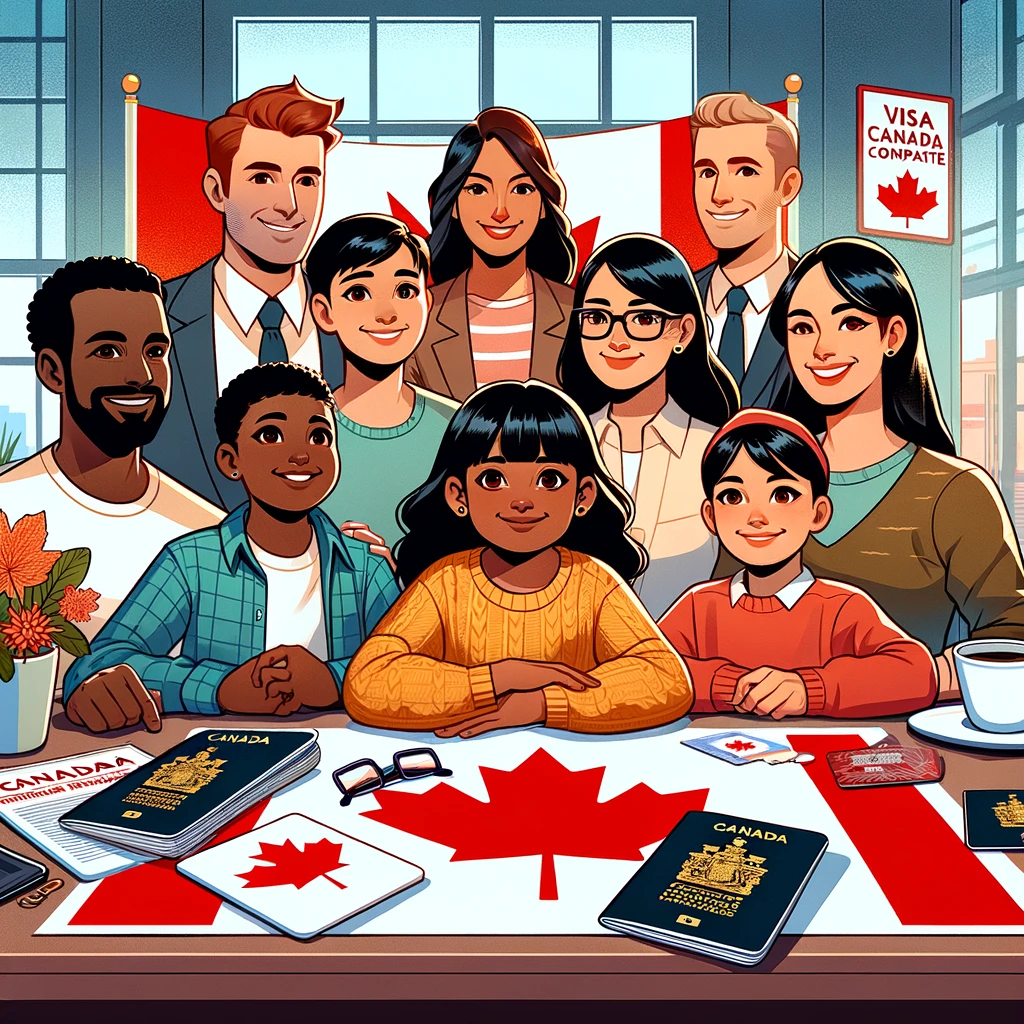Key Takeaways
| Aspect | Details |
|---|---|
| Overview | Understanding the basics of Express Entry for Canadian immigration. |
| Eligibility Criteria | Criteria for Express Entry including work experience, language skills, and educational qualifications. |
| Application Process | Steps involved in creating an Express Entry profile and submitting to the pool. |
| Required Documents | Essential documents needed for the Express Entry application. |
| Additional Resources | Links to further information on related topics like work permits, fees, and immigration services. |
Understanding Express Entry: A Gateway to Canadian Immigration
Express Entry, initiated by the Canadian government in 2015, is an electronic system designed to manage applications from skilled foreign workers aspiring to become permanent residents of Canada. This system represents a critical pathway for individuals seeking to start a new life in Canada, offering a streamlined process with a processing time as short as six months.
Express Entry Programs: Diverse Avenues for Applicants
There are three main federal economic immigration programs under Express Entry:
- Federal Skilled Worker Class (FSWC)
- Federal Skilled Trades Class (FSTC)
- Canadian Experience Class (CEC)
Each program caters to a different set of skills and experiences, thus providing a range of opportunities for potential immigrants.
The Comprehensive Ranking System (CRS)
CRS is a points-based system used to score and rank candidates in the Express Entry pool. Factors like age, education, work experience, and language proficiency in English or French play a crucial role in determining a candidate’s score【.
The Application Journey: From Profile Creation to Permanent Residence
Step 1: Profile Creation
The first step is creating an Express Entry profile, where applicants provide detailed information about their skills, work experience, language abilities, education, and other relevant details. Meeting the criteria of at least one of the three federal economic immigration programs is essential to qualify for the Express Entry pool.
Step 2: Documentation Gathering
Applicants must gather several key documents, such as language test results, education assessments, job offers, police certificates, medical exams, and proof of funds. These documents are crucial for validating the information provided in the Express Entry profile.
Step 3: The Invitation to Apply
Once in the Express Entry pool, candidates wait for an invitation to apply for permanent residence. This invitation is based on their CRS score and the current draw requirements.
Preparing for a New Life in Canada
After receiving an invitation, there are additional steps to complete before crossing the border:
- Finalizing the Application: Submit the completed application along with the necessary supporting documents.
- Preparing for Relocation: Understanding the Canadian job market, exploring housing options, and familiarizing oneself with Canadian culture and norms are essential for a smooth transition.
Eligibility Criteria: Qualifying for Express Entry
To be considered for Express Entry, applicants must meet certain eligibility criteria. These criteria vary depending on the program but generally include:
- Work Experience: Relevant work experience in a skilled profession.
- Language Proficiency: Proficiency in English or French, demonstrated through language test results.
- Educational Qualifications: Educational credentials, often requiring an assessment for foreign qualifications.
For detailed information on the specific requirements for each program, prospective applicants can visit our section on eligibility criteria.
Understanding the Financial Aspect: Fees and Budgeting
Applying for Express Entry involves various fees, including processing fees, right of permanent residence fee, and possibly other costs related to obtaining necessary documents. It’s crucial for applicants to be aware of these expenses and plan accordingly. For a comprehensive breakdown of the fees involved, refer to our fees section.
Language Proficiency: A Key Component
Language skills are a critical part of the CRS score. Applicants need to take approved language tests in English or French and score well to improve their chances of being invited to apply. Resources and tips for language proficiency can be found in our language proficiency section.
Additional Pathways: Provincial Nominee Programs and Others
Apart from the main Express Entry programs, there are additional pathways like the Provincial Nominee Program (PNP), which allows provinces to nominate candidates based on local labor market needs. Understanding these options can provide alternative routes to Canadian permanent residency.
Post-Arrival Steps: Settlement and Integration
Upon arrival in Canada, there are several steps new residents should undertake to ensure a smooth transition:
- Housing: Finding suitable accommodation, understanding rental agreements, and learning about Canadian housing norms.
- Banking and Finances: Setting up a bank account, understanding the Canadian tax system, and managing finances in a new economy.
- Healthcare: Navigating the Canadian healthcare system and understanding how to access medical services.
For assistance in these areas, our settlement services section provides valuable information.

Cultural Adaptation: Overcoming Culture Shock
Moving to a new country can be challenging, and adapting to a new culture is a significant part of the immigration process. Our culture shock section offers resources and advice to help new arrivals adjust to life in Canada.
Additional Resources for Comprehensive Immigration Planning
Education Credentials Assessment
One of the key requirements for Express Entry is the assessment of foreign educational credentials. This process verifies that your education is valid and equivalent to Canadian standards. For more information on how to get your educational credentials assessed, visit our section on education credentials.
Work Permits and Employment in Canada
While Express Entry focuses on permanent residency, understanding the Canadian work permit system is also beneficial, especially for those looking to work in Canada before obtaining permanent residency. Information on obtaining a work permit and insights into the Canadian job market can aid in this process.
Studying in Canada: Study Permits
For those considering furthering their education in Canada, obtaining a study permit is a crucial step. Our study permit section offers guidance on how to navigate this process.
Navigating the Canadian Immigration System: A to Z Guide
For a comprehensive overview of the entire immigration process, our A to Z guide on Canadian immigration offers a wealth of information, covering everything from application processes to settling in Canada.
Permanent Residency to Citizenship Journey
Transitioning from permanent residency to Canadian citizenship is a significant milestone. Our section on citizenship provides valuable insights into this process, including eligibility criteria and application procedures.
Understanding Canadian Healthcare and Documentation
Adjusting to the Canadian healthcare system and understanding the necessary documentation for various immigration processes are crucial for a smooth transition. Our resources provide detailed information on these aspects.
Assistance from Immigration Consultants
Navigating the complexities of immigration can be challenging. For personalized assistance, consider consulting with a professional immigration consultant.
In conclusion, the Express Entry system offers a streamlined pathway for skilled workers to immigrate to Canada. By understanding the eligibility criteria, preparing the necessary documentation, and being aware of the various aspects of the immigration process, applicants can enhance their chances of success. For more detailed guidance, explore our comprehensive resources and consider seeking professional advice.
Frequently Asked Questions (FAQs) about Express Entry
1. What is Express Entry and how does it work?
Express Entry is Canada’s immigration system for managing the applications of skilled workers who wish to become permanent residents. It involves creating an online profile, being entered into a pool of candidates, and potentially receiving an invitation to apply based on a ranking system.
2. What are the main programs under Express Entry?
The three primary programs under Express Entry are:
- Federal Skilled Worker Class (FSWC)
- Federal Skilled Trades Class (FSTC)
- Canadian Experience Class (CEC)
3. What is the Comprehensive Ranking System (CRS)?
The CRS is a points-based system that ranks eligible candidates in the Express Entry pool. Points are awarded based on factors like age, education, work experience, and language proficiency.
4. What documents are required for Express Entry?
Key documents include language test results, educational credential assessments, job offers (if applicable), police certificates, medical exams, and proof of funds.
5. How long does the Express Entry process take?
The processing time can be as short as six months, but this varies based on individual circumstances and the current processing times of the Canadian immigration authorities.
6. Can I work in Canada while my Express Entry application is being processed?
To work in Canada while waiting for permanent residency, you would typically need a separate work permit. Information on obtaining a work permit can be found here.
7. Is language proficiency important for Express Entry?
Yes, proficiency in English or French is crucial and significantly affects your CRS score. It is assessed through standardized language tests.
8. Can I include my family in my Express Entry application?
Yes, you can include your spouse or common-law partner and dependent children in your application for permanent residency.
9. How often are Express Entry draws conducted?
Express Entry draws are typically conducted every two weeks, but this schedule can vary.
10. What happens if my Express Entry application is rejected?
If your application is rejected, you can address the reasons for rejection and reapply. It’s advisable to consult with an immigration consultant for guidance on reapplication.



